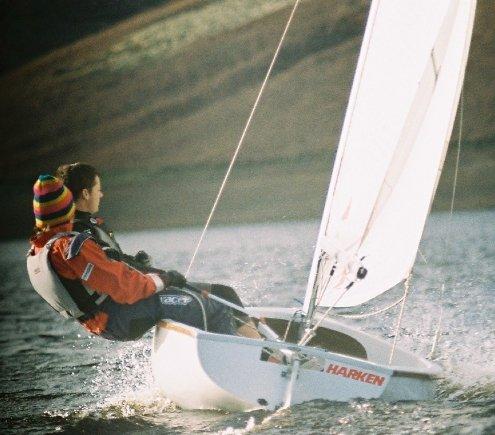Simple Racing Rules |
Post Reply 
|
Page <1 910111213 18> |
| Author | ||||
JimC 
Really should get out more 

Joined: 17 May 04 Location: United Kingdom Online Status: Offline Posts: 6662 |
 Post Options Post Options
 Quote Quote  Reply Reply
 Topic: Simple Racing Rules Topic: Simple Racing RulesPosted: 13 Aug 15 at 7:11pm |
|||
I'm not entirely convinced a set of rules that most of use would use once a year is a great idea! Go back to first principle. Why do we have RRS instead of just using colregs (as used to be done 70 odd years ago I believe). And the answer is because colregs were found to be quite inadequate for close quarters racing. Where we don't want close quarters racing (eg Tall Ships, or racing in the dark when you don't know who is racing and who isn't) we still use ColRegs. If any of you want to convince me that using simplified rules like the becker ones I quoted is viable for general competitive club racing then a good start will be to work through some of the case book examples and tell us what boats get penalised, and how they should know whether they are in the wrong as the situation develops. The case book is here http://www.sailing.org/tools/documents/20132016ISAFCaseBookUpdatedJan2015-[18282].pdf for the diagrams. Start by working through, I dunno, these three.
Edited by JimC - 13 Aug 15 at 7:13pm |
||||
 |
||||
Rupert 
Really should get out more 
Joined: 11 Aug 04 Location: Whitefriars sc Online Status: Offline Posts: 8956 |
 Post Options Post Options
 Quote Quote  Reply Reply
 Posted: 13 Aug 15 at 8:02pm Posted: 13 Aug 15 at 8:02pm |
|||
|
Isn't saying that football is too complex, it needs simple rules, pretty similar? After all, they work for a kick about in the park, till the fights break out...
Fact is, most of those of us who race regularly USE the rules, we play the game by them, they aren't just there to stop us bumping into each other. It is part of what makes racing interesting. |
||||
|
Firefly 2324, Puffin 229, Minisail 3446 Mirror 70686
|
||||
 |
||||
iiiiitick 
Far too distracted from work 
Joined: 19 May 15 Online Status: Offline Posts: 240 |
 Post Options Post Options
 Quote Quote  Reply Reply
 Posted: 13 Aug 15 at 8:29pm Posted: 13 Aug 15 at 8:29pm |
|||
|
Probably contradicting myself here. The trouble with simple rules is that when they prove inadequate we need amendments.
|
||||
 |
||||
Solo4652 
Groupie 
Joined: 08 Apr 15 Location: Stockport Online Status: Offline Posts: 71 |
 Post Options Post Options
 Quote Quote  Reply Reply
 Posted: 13 Aug 15 at 8:43pm Posted: 13 Aug 15 at 8:43pm |
|||
|
Hello Jim
I'm just wondering whether this is the "mindshift barrier" here - no offence intended, by the way, Jim. As I read through your Cases, I glaze over. Even the description of the incident is couched in the usual legalese, and that's before we even start looking at the relevant rules. Let's change our way of thinking, just for a moment. Let's put the current rules aside and go with the simpler ones. Case 9, which some people might call "complex". Why is this Case seen as complex? It could be seen as simple, if we wanted to; The boats have to get themselves round the mark without colliding with each other. Exactly how they do that is up to them. If somebody can see a collision coming (whether or not they regard it as their fault) they have to avoid it, otherwise they're DSQ. That's it. Sure, it changes the game. Maybe it would change the game for the better, and it's entirely possible that the game needs changing anyway. Case 93 - Same, really. I have to read and re-read it a few times just to understand the "incident", and that's before we get the rule book out. Once again, the "complexity" evaporates if you say something like; The rules simply require you to get your boat round the agreed course without colliding with another boat. If you do collide with another boat, you're DSQ. Outside of that, it's "racing". Jim, you ask; "If any of you want to convince me that using simplified rules like the becker ones I quoted is viable for general competitive club racing then a good start will be to work through some of the case book examples and tell us what boats get penalised, and how they should know whether they are in the wrong as the situation develops." Well, we've looked at some of your Cases, and things could be seen as simple - the boats that get penalised are the ones that hit another boat. That's it. Thinking about it, maybe we should look again at the Colregs approach - back to the KISS principle. It's going to take a mindshift though - we'll need to think of the rules as rules of safety rather than rules of racing. OK - fine. We could have a few simple rules that get boats around a course safely. Once that's achieved, anything else is OK, and is called "racing". Almost at a stroke, we can make "Complex" situations much, much simpler. No Zones, no room to manoeuvre, no establishing overlaps from behind, no proper course, no illegal propulsion - none of that. Get yourself around the agreed course without colliding with anybody, otherwise you're disqualified. No ifs, no buts. Just do it. Eeeek. Edited by Solo4652 - 13 Aug 15 at 9:00pm |
||||
 |
||||
Quagers 
Far too distracted from work 

Joined: 24 Oct 06 Location: United Kingdom Online Status: Offline Posts: 279 |
 Post Options Post Options
 Quote Quote  Reply Reply
 Posted: 13 Aug 15 at 9:05pm Posted: 13 Aug 15 at 9:05pm |
|||
|
>Let's change our way of thinking, just for a moment. Let's put the current rules aside, and look at your Case 9, which some people might call "complex". Why is this Case seen as complex? It could be seen as simple, if we wanted to; The boats have to get themselves round the mark without colliding with each other. Exactly how they do that is up to them. If somebody can see a collision coming (whether or not they regard it as their fault) they have to avoid it, otherwise they're DSQ. That's it. Sure, it changes the game. Maybe it would change the game for the better, and it's entirely possible that the game needs changing anyway.
Because in this scenario the less experienced racer will be scared off sooner than the experienced guy, handing the latter a massive advantage. Or what if they both try to avoid the collision, go in the same way and end up hitting each other? You have to have a concept of a right of way and give way boat so that everyone knows what is expected of them. The scenarios you describe without these rules just lead to confusion and that thing on the pavement where you both keep trying to avoid each other and end up colliding. The rules used to be simple, hit someone, DSQ. If you try to understand why thats no longer the case then you'll see why the rules are as they are. Also, if I get DSQ'd from every race I make a tiny mistake in im going to lose interest pretty quick. The rules really are not that complex, there are many many good beginners guides out there than cover 99% of cases you'll actually see on the race course. Hell we used to teach them to bunch of barely sober freshers well enough to use them as a weapon in 5 or 6hrs in my uni days.
|
||||
 |
||||
Solo4652 
Groupie 
Joined: 08 Apr 15 Location: Stockport Online Status: Offline Posts: 71 |
 Post Options Post Options
 Quote Quote  Reply Reply
 Posted: 13 Aug 15 at 9:09pm Posted: 13 Aug 15 at 9:09pm |
|||
|
@Quagers; "You have to have a concept of a right of way and give way boat so that everyone knows what is expected of them. The scenarios you describe without these rules just lead to confusion and that thing on the pavement where you both keep trying to avoid each other and end up colliding."
I like that example! Made me smile. An awful lot of the time, people don't need rules to enable them to walk along pavements without colliding with others. It's enough for them to go into this "complex" pavement-walking task with the simple aim of not bumping into other people. Even if some rules are needed, they don't have to be complex. I know I've posted this link before, but it may have gone unnoticed amongst my brain-dump waffling. If I'm reading this right, here are just 3 rules that are currently being used to govern high-speed yacht racing; See pages 19 to 21 of; http://www.britishlandsailing.org.uk/uploads/1/0/2/9/10293636/training_manual_presentation_v5.pdf Edited by Solo4652 - 13 Aug 15 at 9:36pm |
||||
 |
||||
deadrock 
Groupie 
Joined: 24 Jun 08 Location: United Kingdom Online Status: Offline Posts: 85 |
 Post Options Post Options
 Quote Quote  Reply Reply
 Posted: 13 Aug 15 at 10:34pm Posted: 13 Aug 15 at 10:34pm |
|||
|
I've just found online Mark Rushall's history of the RRS in order to look up when the RRS changed in a previous fit of simplification. Interesting stuff. If you think the RRS are complex now, before the wholesale revision for the 1997 edition (here I paraphrase the process for simplicity) the Rules, especially Part 2, were fiendishly complicated. I have hung onto my copy of Mary Pera's book for the 1989-92 Rules as an excellent example of explaining a complex subject thoroughly (including the Cases and Appeals) in terms that could easily be understood.
I haven't done any research to back this up, but the RRS prior to 1997 had become really complicated. And then there were the Appeals cases to contend with. My impression (and I may well be wrong) is that since the 1997 revision the Rules (esp. Pt 2) have been kept simple, with the complexity channeled into the ISAF Regs and appeals. Now the RRS on their own are insufficient reference for anyone to take into a Protest room. Perhaps anyone who has kept hold of all his editions of the RRS from 1981 could tell me whether this has any traction. Discuss. Deadrock.
|
||||
 |
||||
Chris 249 
Really should get out more 

Joined: 10 May 04 Online Status: Offline Posts: 2041 |
 Post Options Post Options
 Quote Quote  Reply Reply
 Posted: 13 Aug 15 at 11:40pm Posted: 13 Aug 15 at 11:40pm |
|||
Well, if there's no illegal propulsion then the sport will change from sailing to a row/pump/paddle/motoring competition a lot of the time!  If I luffed you so hard from a port tack broad reach that you couldn't avoid your bow hitting mine, wouldn't you be rather unfairly DSQd under your rules since you would have been seen to be the one who collided with me? What about if you managed to avoid my stupidly-sudden luff initially, but I kept on luffing until you rammed a bunch of starboard tackers going to windward? Would it be fair if you were the one DSQ'd? What about if you were becalmed with little if at all steerage way a length away from a mark and I was coming down in my Hurricane 5.9 clone in a gust, steering for the 9' wide gap between you and the mark. If you moved 1' further forward as the gust hit, despite doing all you could to avoid the sudden apparition of a 20' cat in front of you, would it fair if you were the one DSQd for hitting me? If you were on port and I was on starboard and hunted you down, ducking and weaving so despite your frantic efforts to wriggle away you hit me, would it be fair if you were DSQ'd? What about if I was on my windsurfer and, in a calm patch where you couldn't get away, I reversed and pumped backwards so that your bow hit my stern? How can one Laser, Opti, RS200 or Tasar avoid every boat in a crowded mark rounding where 50 boats have come together, when those boats are not governed by any ROW rules? I think car racing largely follows the "rubbing is racing" concept plus some rules about cutting people off, but then the whole course is under the scrutiny of judges who will black flag racers if they feel they are driving unfairly. It's the same with cycle racing, which leads to a lot of postmortems and perhaps a lot of the crashes. Even surfers have RoW rules, and endless discussions and debates about them. Having said all that, slalom windsurfers have used simplified mark rounding rules, partly because they probably approach gybes marks faster and more often than anything else much of the time. I'm not sure they would translate into normal racing, where there is a greater range of speeds and angles and bigger fleets. The Australian Skiff classes used to use ColRegs but gave it up, partly because it lead to difficulties when they became mixed up with boats sailing under ISAF rules. The other issue is that you can't really race under Colregs, strictly applied. Edited by Chris 249 - 13 Aug 15 at 11:49pm |
||||
 |
||||
Chris 249 
Really should get out more 

Joined: 10 May 04 Online Status: Offline Posts: 2041 |
 Post Options Post Options
 Quote Quote  Reply Reply
 Posted: 14 Aug 15 at 12:33am Posted: 14 Aug 15 at 12:33am |
|||
1- Perhaps the simple rules work for situations with small fleets at roughly uniform speeds, but collapse when fleets become much larger and speeds vary dramatically, as they do in light wind championship races? I've done pro slalom racing under the simple rules but can't see them working in Lasers or half tonners. So can you provide us with a detailed scenario of say 60 Solos at a title blowing downwind to a gybe mark where there has been a lull, and explain how would it work for 10 of them under the rules above? Say boat A was the leader. He has reached the mark two lengths above it on port, having sailed high to avoid a lull, clear his air, avoid another boat or whatever. He now gybes, moving at 1/2 knot, and is 14' from the mark with very little steerage way. Boat B was in second place. He picks up the first of the new breeze from three lengths away from the mark. Can he dive into the rapidly narrowing gap between A and the mark? What about C, who is overlapped with B on the port side, and D who is overlapped with C to port of him, E who is overlapped with B to starboard, and F who is overlapped to starboard of E? Boats G to Z are in line abeam running before the new breeze. They are converging on the mark. What does G (on the inside) do? What about the boat in the middle? What about Z, on the outside? A2 (on the inside) to G2 (on the outside) are running behind the line of G to Z, four lengths back but catching quickly on a gust. Can they just charge in as the hapless Z tries to get around the mark? What happens if Z wriggles out of his position and reaches across the stern of G-Z and then bears away on the inside of A2? What about Y, who does the same thing a little bit earlier? 2 - Is there something basically problematic about allowing too many degrees of freedom in a complex situation involving multiple people at widely different speeds and angles? Wouldn't this be a non-linear problem, where every time you allow another possible course for each boat you increase the number of possible interactions with others exponentially? At the moment, each boat in a group of 10 approaching a mark may have 5 realistic options under the rules, and each of those options would then open up another 5 reactions from the other boats. Every time a boat takes one of those 5 reactions, then a further chain of options opens up. However, if you drop the rules don't you increase the number of realistic options dramatically? Once the number of possible options is increased, the number of possible outcomes explodes, possibly to a point where no skipper can work out how the situation will unfold. We've all seen a simple situation transform when someone to leeward of a bunch suddenly starts luffing someone within the constraints of the current rules; without such constraints what would happen? I seem to recall some work in non-linear equations about pedestrian flow that underline how quickly a well ordered flow can collapse into chaos if the "rules" are changed. I may try to find it and see if it can be applied. PS - Some old books like those of Dixon Kemp shows how the rules evolved initially. The cases show that the simple early rules resulted in a lot of uncertainty, and there seem to have been a lot of protests as a result. New rules were added as a result of the real-life incidents that showed real-life gaps in the rules; they weren't added in an attempt to make the rules complicated or as a theoretical exercise. Edited by Chris 249 - 14 Aug 15 at 12:48am |
||||
 |
||||
Solo4652 
Groupie 
Joined: 08 Apr 15 Location: Stockport Online Status: Offline Posts: 71 |
 Post Options Post Options
 Quote Quote  Reply Reply
 Posted: 14 Aug 15 at 1:23am Posted: 14 Aug 15 at 1:23am |
|||
|
What if both boats involved in a collision were DSQ'd? That might concentrate people's minds on sailing fast and not getting involved in collisions.
Alternatively, we could allow ourselves the luxury of the 8 rules posted above. Here they are, for reference; •1. Avoid collisions. •2. Port keeps clear of starboard. •3. Windward keeps clear of leeward •4. Overtaking boat keeps clear •5. Give boats enough time and room to avoid hitting things. •6. The inside boat(s) at a mark is entitled to room to round the mark. •7. If you have violated a rule, do a tack and a gybe as soon as you safely can. .8 Behave towards others in the same way you'd want them to behave towards you. Applying these to your scenarios, we get; You luff me hard, we collide. I'm DSQ'd under rule 3 and you're DSQ'd under rule 1 You luff me hard into some other boats. You're DSQ'd under rule 5 You hunt me down on Starboard. We collide. You're DSQ'd under rule 5 and rule 1 I'm becalmed and you reverse your windsurfer into me. You're disqualified under rule 5 and rule 1 Is there something in this, do you think? |
||||
 |
||||
Post Reply 
|
Page <1 910111213 18> |
| Forum Jump | Forum Permissions  You cannot post new topics in this forum You cannot reply to topics in this forum You cannot delete your posts in this forum You cannot edit your posts in this forum You cannot create polls in this forum You cannot vote in polls in this forum |
Bulletin Board Software by Web Wiz Forums® version 9.665y
Copyright ©2001-2010 Web Wiz
Change your personal settings, or read our privacy policy
Copyright ©2001-2010 Web Wiz
Change your personal settings, or read our privacy policy

























 Printable Version
Printable Version Delicious
Delicious Digg
Digg Facebook
Facebook Furl
Furl Google
Google MySpace
MySpace Newsvine
Newsvine reddit
reddit StumbleUpon
StumbleUpon Twitter
Twitter Windows Live
Windows Live Yahoo Bookmarks
Yahoo Bookmarks Topic Options
Topic Options